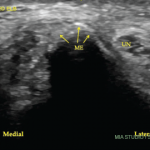 SAN DIEGO—In the Curbside Consults session at ACR Convergence 2023, experts provided overviews of, and insights into, ulcers, nerve entrapment and autoimmune-related hearing loss.
SAN DIEGO—In the Curbside Consults session at ACR Convergence 2023, experts provided overviews of, and insights into, ulcers, nerve entrapment and autoimmune-related hearing loss.
Oral Uclers
During his presentation, Haner Direskeneli, MD, chief of rheumatology at Marmara University School of Medicine, Istanbul, discussed the need to differentiate between ulcer types and causes, as well as treatment strategies.
Dr. Direskeneli described the case of a 45-year-old, male physician who’d had recurrent oral ulcers for 10 years, with unsatisfactory treatment results. The patient eventually saw a dermatologist and was diagnosed with herpes zoster. Treatment with an anti-viral completely healed him in a week. The lesson is simple: “Not all oral lesions are aphthous ulcers,” he said.
Acute, immune-mediated lesions of the oral cavity may be a better term for oral lesions, Dr. Direskene suggested. Oral lesions can come in many forms, including erythema multiforme, burning or itchy pink papules and pemphigus, which is seen as irregular ulcerations. Recurrent oral ulcers or aphthous stomatitis are well-circumscribed, often depressed lesions with an epithelial defect covered by a fibrin clot, causing a yellowish-white appearance.
Systemic disorders that involve aphthous-like ulcers include nutritional diseases; immunocompromised states, such as HIV; rheumatic diseases, such as Behçet’s disease, reactive arthritis and lupus; gastrointestinal diseases, such as inflammatory bowel diseases and gluten-sensitive enteropathy; and hematologic disorders, such as cyclic neutropenia.
Behçet’s disease ulcers can’t be readily distinguished from other recurrent aphthous stomatitis. “You cannot define the underlying cause by only looking at the ulcers,” Dr. Direskeneli said. Non-specific signs of Behçet’s are oral ulcers, erythema nodosum and anterior uveitis. More specific signs are genital ulcers, posterior uveitis or retinitis, vascular manifestations and central nervous system involvement.
In patients with systemic lupus erythematosus (SLE), oral ulcers have been seen in 7–52% of cases. Irregular, painless ulcers are most commonly seen in the buccal mucosa and the hard palate, and are associated with general disease activity.
Inflammatory bowel disease, MAGIC (i.e., mouth and genital ulcers with inflamed cartilage) syndrome, PFAPA (i.e., periodic fever, aphthous stomatitis, pharyngitis and adenitis) and A20 haploinsufficiency are other systemic inflammatory disorders associated with the ulcers.
Ulcers lasting more than three weeks should be assessed for possible malignancy, Dr. Direskeneli noted.
Patient Care
Topical treatments are the first choice for recurrent oral ulcers, but they don’t prevent future recurrence. Colchicine is the first systemic choice, Dr. Direskeneli said. In his opinion, azathioprine can be the first choice for difficult-to-treat cases. Apremilast may be a safer and more effective option and is approved by the U.S. Food & Drug Administration for recurrent oral ulcers of Behçet’s disease. However, insurance reimbursement issues may limit its use.


